As a holistic veterinarian, I understand the deep bond you share with your Bolognese. These adorable, fluffy companions are more than just pets – they’re family. That’s why it’s essential to prioritize their health, especially when it comes to their eyes. In this article, we’ll be focusing on Bolognese Eye Health, a topic that doesn’t always receive the attention it deserves.
Bolognese dogs, with their expressive eyes, are prone to specific eye health issues due to their unique breed characteristics. Whether you’re a new Bolognese parent or a seasoned one, understanding these potential problems can help you take proactive measures to protect your pet’s vision.
We’ll explore common eye diseases in Bolognese dogs, from minor infections to more serious conditions. But don’t worry – it’s not all gloomy. We’ll also discuss preventive measures, including a holistic diet rich in Vitamin A and antioxidants, whole-food-based nutritional supplements, and maintaining good environmental hygiene. Plus, I’ll share some practical tips on routine Bolognese Dog Eye Care.
So, let’s embark on this journey together to ensure your Bolognese’s eyes remain as bright and healthy as their personality. Remember, caring for your pet’s eyes is a crucial part of their overall health and well-being.
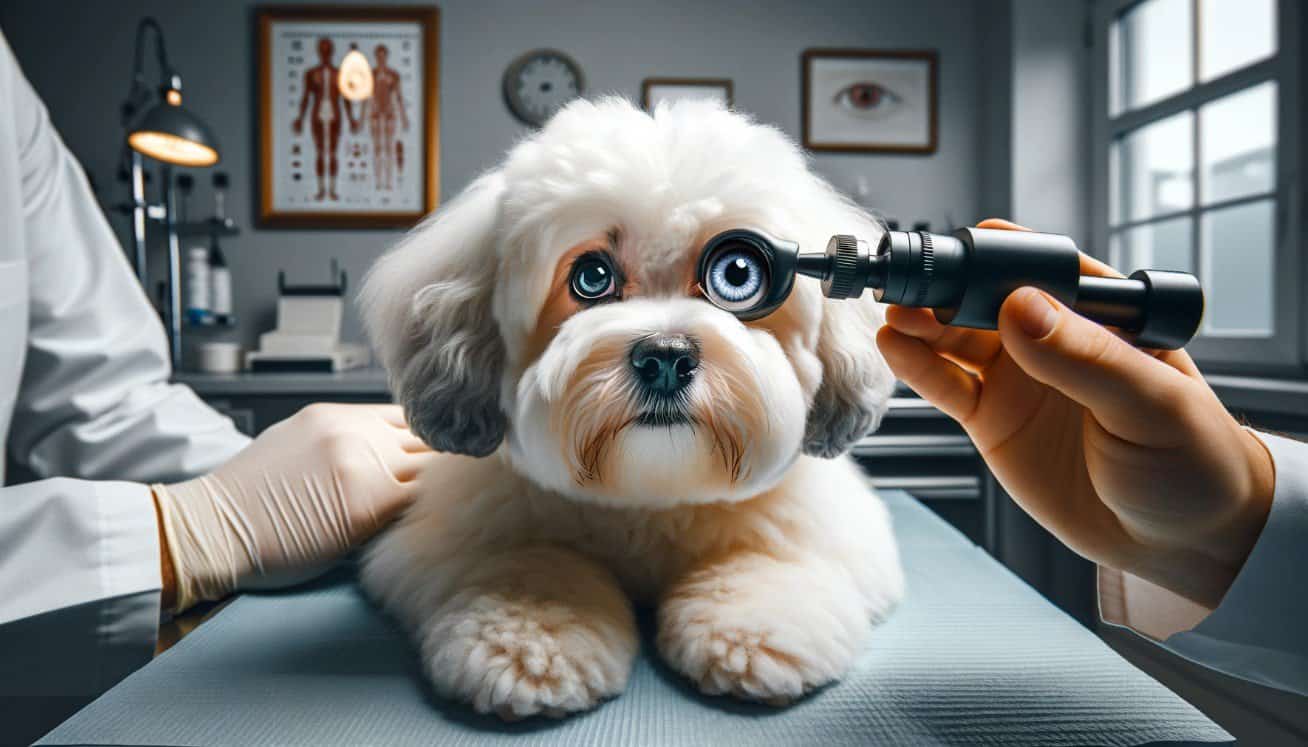
Understanding Breed Specific Eye Structure
As a holistic veterinarian, I often hear from pet parents with concerns about their Bolognese’s eye health. Understanding the unique eye structure of this breed is crucial in maintaining their overall health and well-being.
The Bolognese, like most breeds, have a pair of almond-shaped eyes that are dark brown in color. This breed’s eyes are particularly expressive, adding to their charming and endearing demeanor. However, the structure of their eyes also makes them more susceptible to certain health conditions.
The Bolognese has a shallow eye socket compared to other breeds, which means their eyes are more prominent. This unique structure can make their eyes more prone to dryness, as the tear film covering the eye’s surface may evaporate more quickly.
Moreover, the Bolognese has a longer eyelash growth cycle, which is why they have such lovely, long lashes. While these lashes add to their appeal, they can also cause irritation if they grow too long or curve inward, scratching the cornea.
Another distinctive feature of the Bolognese’s eye structure is their tear ducts. These dogs have relatively narrow tear ducts, which can lead to tear overflow, otherwise known as ‘tear staining’. This can cause a reddish-brown discoloration under their eyes, which is not only unattractive but can also lead to skin irritation and infection if not properly managed.
Finally, Bolognese dogs also have a third eyelid, known as the haw, which helps protect their eyes from injury and keeps them moist. However, certain conditions can cause this third eyelid to become visible, a condition known as ‘cherry eye’, which requires immediate veterinary attention.
Understanding your Bolognese’s specific eye structure is the first step towards proactive eye care. By recognizing the unique characteristics and potential risks, you can take preventative measures to maintain your pet’s eye health. In the next section, we’ll delve into the common eye issues that Bolognese dogs often face and discuss how to prevent and treat these conditions.
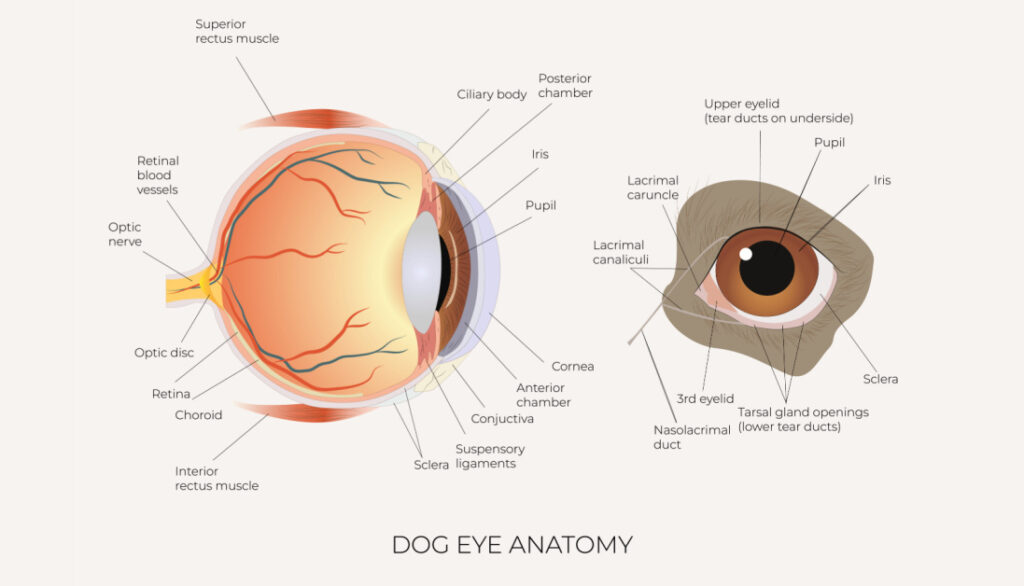
Common Eye Issues In Bolognese
As a veterinarian, I often encounter various health issues in different dog breeds. Among them, Bolognese Eye Health is a topic of concern for many pet parents. Bolognese dogs, with their expressive and adorable eyes, are prone to several eye problems. Understanding these issues can be a significant step towards ensuring your beloved pet’s health and happiness.
- Cataracts: This is a common eye issue that can affect Bolognese dogs. Cataracts cause a cloudy appearance in the eye and can lead to vision loss if not treated promptly. They can be hereditary or develop as a result of diabetes or old age.
- Progressive Retinal Atrophy (PRA): PRA is a group of genetic diseases that cause the retina’s gradual deterioration, leading to impaired vision or even blindness. Unfortunately, there’s currently no cure for PRA, but early detection can help manage the condition.
- Cherry Eye: This condition occurs when the gland in the dog’s third eyelid becomes inflamed or prolapsed, creating a cherry-like appearance. It’s not typically painful but can lead to secondary infections or dry eye if left untreated.
- Dry Eye (Keratoconjunctivitis Sicca): This condition is characterized by inadequate tear production, leading to dry, itchy, and irritated eyes. If left untreated, it can lead to corneal damage and vision loss.
- Entropion: This is a genetic condition where the eyelid rolls inward, causing the lashes to rub against the cornea, leading to discomfort, corneal ulcers, or vision loss.
Remember, Bolognese Eye Health is integral to your pet’s overall well-being. Regular check-ups and immediate attention to any eye abnormalities can prevent these conditions from worsening. As a pet parent, your vigilance can make a significant difference in your Bolognese’s eye health.
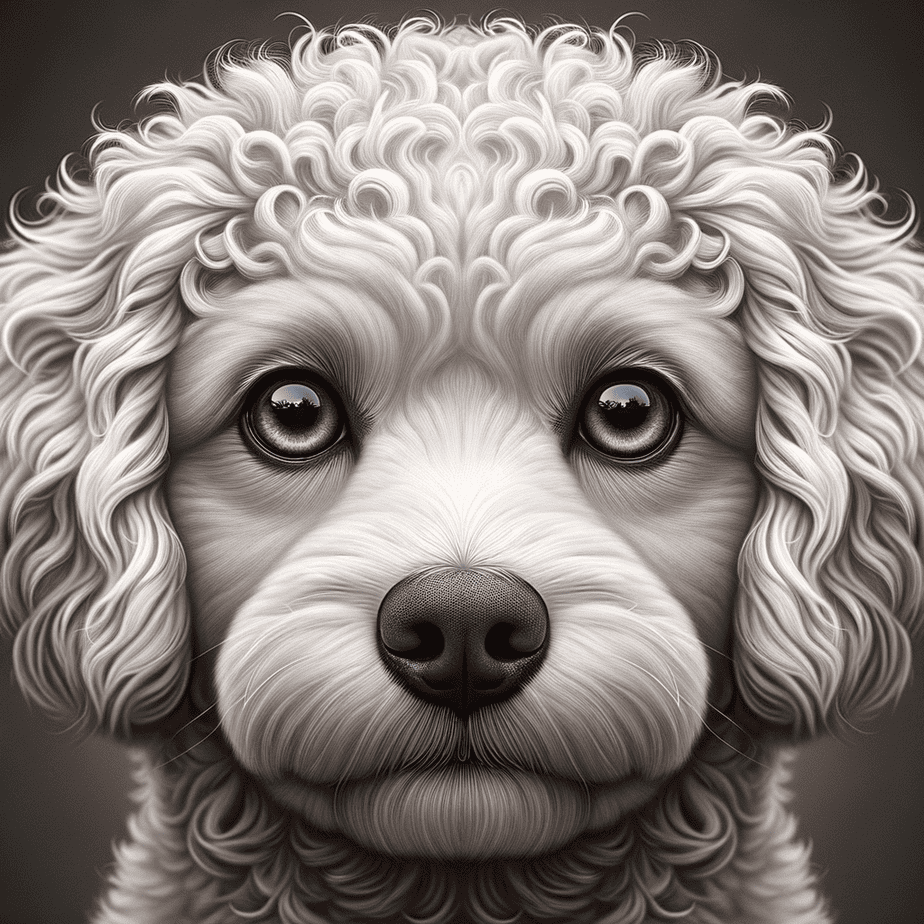
Preventing eye problems in your Bolognese dog is crucial to ensure they maintain their sight and overall eye health. A couple of key factors that can help prevent these issues include a holistic diet and whole-food-based nutritional supplements.
Nourishing Your Dog’s Vision: Essential Nutrients for Eye Health
Ensuring your Bolognese gets the right nutrients for optimal eye health is essential for maintaining clear vision and preventing age-related issues. Natural, nutrient-rich foods and supplements can play a key role in supporting their eyesight. From vitamin A-packed freeze-dried liver treats to antioxidant-rich blueberries and targeted supplements like Eyeplex by Standard Process, there are several ways to nourish your dog’s eyes. In this section, we’ll explore how these powerful ingredients contribute to long-term vision health and overall well-being.
Eyeplex by Standard Process
Eyeplex by Standard Process is a specialized supplement designed to support your Bolognese’s eye health with a blend of essential nutrients. Formulated with key vitamins, minerals, and antioxidants, Eyeplex helps protect against oxidative stress, supports retinal function, and promotes overall vision health. Ingredients like vitamin A, vitamin C, and zinc contribute to maintaining strong eyesight, while whole food ingredients provide additional phytonutrients for cellular protection. Adding Eyeplex to your Bolognese’s diet can be especially beneficial for aging dogs or breeds prone to eye conditions, offering targeted nutritional support to keep their vision sharp and healthy for years to come.
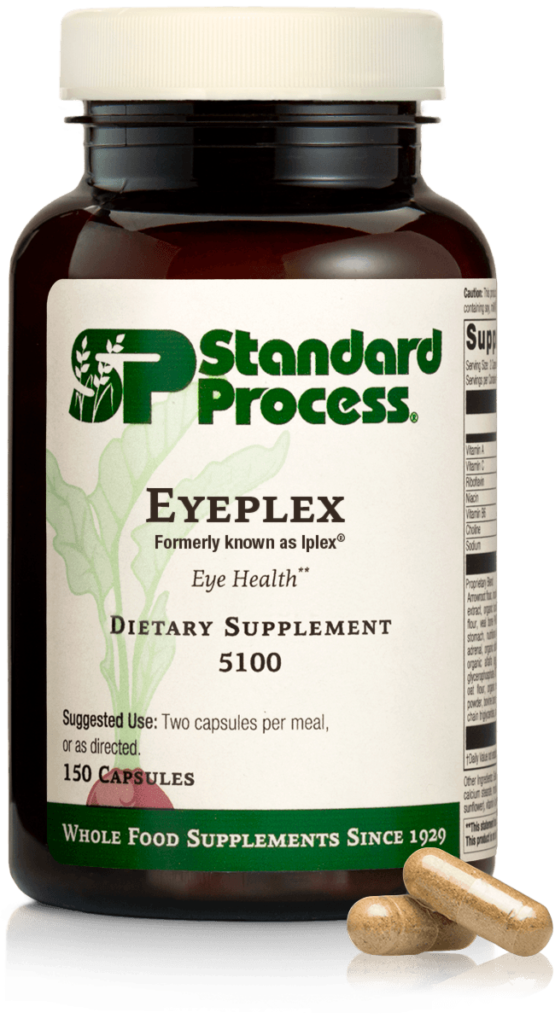
Freeze-Dried Blueberries
Freeze-dried blueberries are a powerhouse of antioxidants that can help protect your Bolognese’s eyes from oxidative stress and age-related damage. Rich in vitamins C and E, as well as anthocyanins, these tiny but mighty berries help combat free radicals that can contribute to eye diseases like cataracts and macular degeneration. Incorporating freeze-dried blueberries into your dog’s diet provides a natural and delicious way to support retinal health, reduce inflammation, and promote overall vision longevity. Plus, they’re a low-calorie, dog-friendly treat that makes a great addition to a balanced diet for long-term eye health.
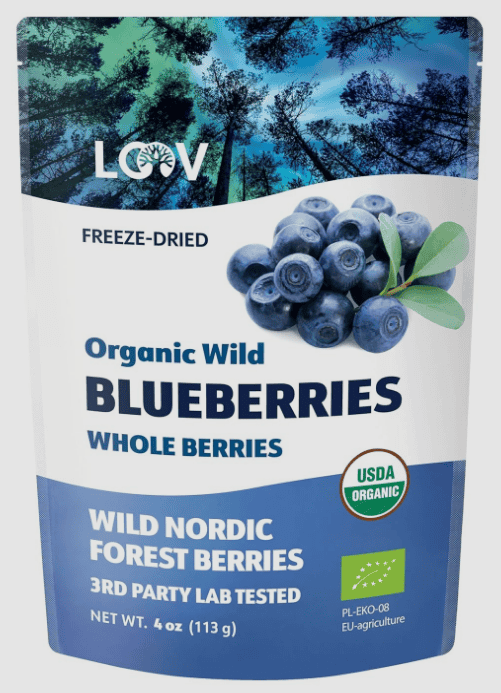
Freeze-Dried Liver
Freeze-dried liver treats are an excellent natural source of vitamin A, an essential nutrient for your Bolognese’s eye health. Vitamin A plays a crucial role in maintaining good vision, especially in low-light conditions, while also supporting overall immune function and skin health. Since liver is rich in bioavailable vitamin A, incorporating freeze-dried liver treats into your dog’s diet provides a convenient and nutritious way to promote optimal eye function. Just be sure to feed them in moderation, as excessive vitamin A can lead to toxicity. Adding these nutrient-packed treats to your pup’s routine is a simple, tasty way to support their long-term vision and well-being!
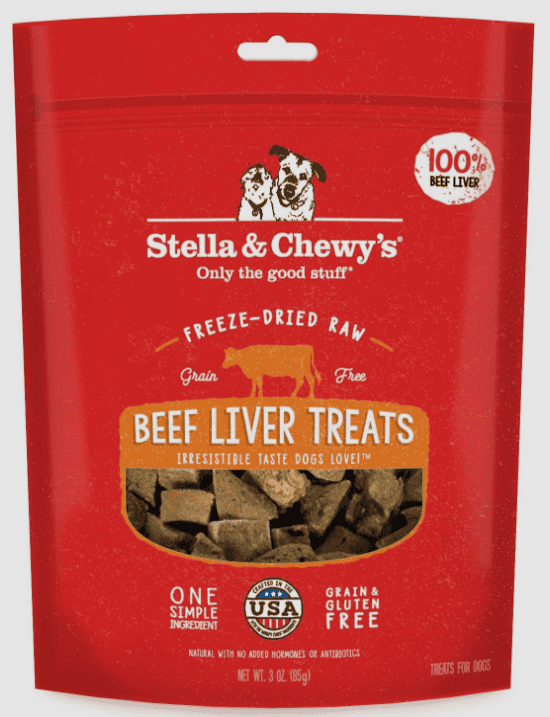
By prioritizing your Bolognese’s eye health through a balanced diet and nutritional supplements, you can help prevent many common eye issues. These simple steps can go a long way in ensuring your pup’s eyes stay healthy and clear for years to come.
Environmental Hygiene To Reduce Eye Problems
When it comes to maintaining your Bolognese’s eye health, the environment plays a crucial role. There are a few key aspects to consider to ensure your furry friend is living in a clean, safe environment that promotes good eye health.
Indoor Air Quality
Firstly, the quality of indoor air can significantly impact your Bolognese’s eye health. Poor air quality may result in irritants such as dust, mold spores, and pet dander, which can cause eye irritation, allergies, and even infections. Therefore, it is essential to maintain good indoor air quality. You can achieve this by regularly cleaning your home, using air purifiers, and ensuring proper ventilation. Also, avoid smoking indoors as tobacco smoke can be harmful to your Bolognese’s eyes.
Sprays, Diffusers, Candles, Incense
Secondly, be mindful of the products you use around your home. Certain sprays, diffusers, candles, and incense can contain chemicals that irritate your Bolognese’s eyes. Always opt for pet-friendly products and use them sparingly. If you notice your Bolognese squinting, tearing up, or rubbing their eyes after you’ve used a certain product, it’s best to stop using it immediately.
Furthermore, when using cleaning products, ensure your Bolognese is in a different room. The strong chemicals found in many cleaning products can cause severe eye irritation. Once you’ve finished cleaning, thoroughly air out the room before allowing your Bolognese back in.
Lastly, remember that your Bolognese’s eyes are much closer to the ground than yours. Therefore, they are more likely to come into contact with dust and other potential irritants. Regularly vacuuming and mopping your floors can help minimize this risk.
In conclusion, maintaining a clean, safe environment is a critical part of Bolognese eye health. By taking these simple steps, you can help prevent eye problems and ensure your Bolognese’s eyes stay healthy and clear.
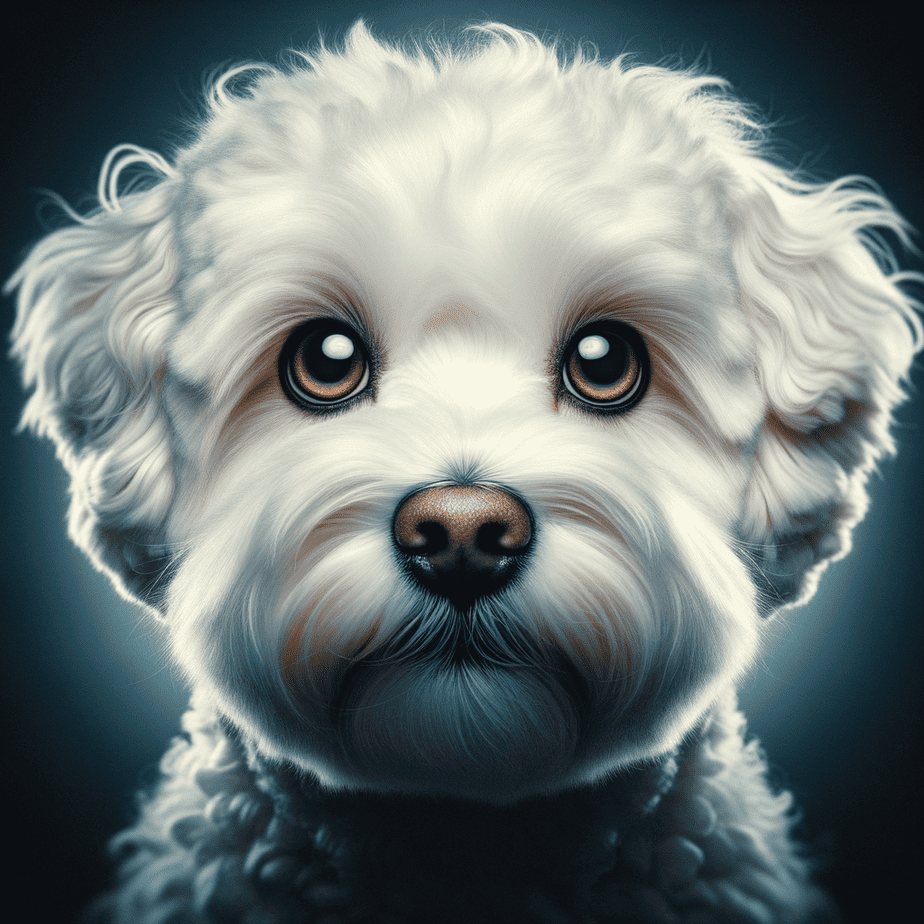
Routine Bolognese Eye Care & Maintenance
When it comes to Bolognese Eye Health, maintaining a regular eye care routine is crucial. It’s not just about identifying and treating issues but also about prevention. Here are some tips on how to ensure your Bolognese’s eyes stay healthy and clear.
Daily & Weekly Care & Maintenance
As a Bolognese parent, you should make a habit of checking your dog’s eyes daily. Look for any signs of redness, swelling, or discharge, which could indicate an infection or other eye problem. Make sure that your Bolognese’s eyes are clear and bright, with no cloudiness or discoloration. Also, the area around the eyes should be clean and free of crust or debris.
While checking the eyes, gently wipe them with a clean, damp cloth to remove any dirt or discharge. But be careful not to touch the eye surface as it can cause irritation. Use a separate cloth for each eye to prevent spreading any potential infection from one eye to the other.
On a weekly basis, consider using a vet-approved eye cleaning solution to help remove any buildup that regular wiping might miss. This can help prevent tear stains, a common issue in Bolognese dogs.
Monitor Hair Length, Nail Length, and Bath Frequency
The Bolognese breed has long, white hair that can easily fall into their eyes and cause irritation or infection. Regularly trimming the hair around their eyes can prevent this. However, it’s critical to use blunt-end scissors and exercise extreme caution to avoid accidental injury.
Keeping your Bolognese’s nails trimmed is also important. Overgrown nails can lead to scratching, which might result in eye injuries. Regular baths can also contribute to Bolognese Eye Health. However, ensure to protect your dog’s eyes during bath time. You can do this by using a vet-approved tearless shampoo and carefully avoiding the eye area when washing their face.
Remember, a healthy Bolognese is a happy Bolognese. Regular eye care and maintenance can go a long way in ensuring your furry friend’s eyes stay healthy. But always consult your vet if you notice any changes or issues with your Bolognese’s eyes. After all, they are a vital part of your dog’s health and well-being.
Frequently Asked Questions
1. What are common eye conditions in Bolognese dogs?
Bolognese dogs can be prone to various eye conditions such as cataracts, progressive retinal atrophy (PRA), dry eye (keratoconjunctivitis sicca), and cherry eye.
2. How can I recognize if my Bolognese dog has an eye problem?
Watch out for signs such as redness, excessive tearing, discharge, squinting, cloudiness, frequent blinking, pawing at the eyes, or any changes in the appearance or behavior of the eyes.
3. Can I prevent eye problems in my Bolognese dog?
While some eye conditions may be hereditary or age-related, you can take certain preventive measures. Regularly clean your dog’s eyes, keep them protected from dust and debris, provide a balanced diet with essential nutrients, and schedule routine eye check-ups with a veterinarian.
4. What should I do if I suspect my Bolognese dog has an eye problem?
If you notice any concerning symptoms or changes in your dog’s eyes, it is important to consult a veterinarian as soon as possible. They can perform a thorough examination, provide a diagnosis, and recommend appropriate treatment options.
5. How are eye conditions in Bolognese dogs typically treated?
The treatment for eye conditions in Bolognese dogs depends on the specific condition and its severity. It may involve medications, eye drops, ointments, surgery, or other interventions as deemed necessary by the veterinarian.
